英语语法-齐辙
- 格式:docx
- 大小:88.98 KB
- 文档页数:45
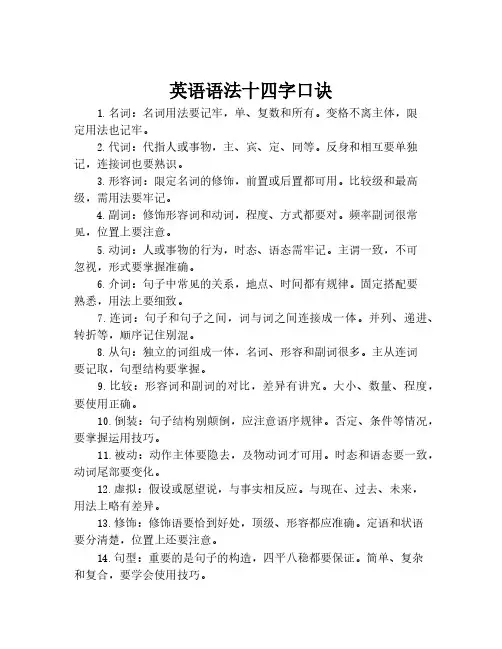
英语语法十四字口诀1.名词:名词用法要记牢,单、复数和所有。
变格不离主体,限定用法也记牢。
2.代词:代指人或事物,主、宾、定、同等。
反身和相互要单独记,连接词也要熟识。
3.形容词:限定名词的修饰,前置或后置都可用。
比较级和最高级,需用法要牢记。
4.副词:修饰形容词和动词,程度、方式都要对。
频率副词很常见,位置上要注意。
5.动词:人或事物的行为,时态、语态需牢记。
主谓一致,不可忽视,形式要掌握准确。
6.介词:句子中常见的关系,地点、时间都有规律。
固定搭配要熟悉,用法上要细致。
7.连词:句子和句子之间,词与词之间连接成一体。
并列、递进、转折等,顺序记住别混。
8.从句:独立的词组成一体,名词、形容和副词很多。
主从连词要记取,句型结构要掌握。
9.比较:形容词和副词的对比,差异有讲究。
大小、数量、程度,要使用正确。
10.倒装:句子结构别颠倒,应注意语序规律。
否定、条件等情况,要掌握运用技巧。
11.被动:动作主体要隐去,及物动词才可用。
时态和语态要一致,动词尾部要变化。
12.虚拟:假设或愿望说,与事实相反应。
与现在、过去、未来,用法上略有差异。
13.修饰:修饰语要恰到好处,顶级、形容都应准确。
定语和状语要分清楚,位置上还要注意。
14.句型:重要的是句子的构造,四平八稳都要保证。
简单、复杂和复合,要学会使用技巧。
以上是英语语法的十四字口诀,希望能够对你的学习有所帮助。
掌握好这些要点,能够更加准确地运用英语语法,提高自己的写作和表达能力。
祝你学习顺利!。
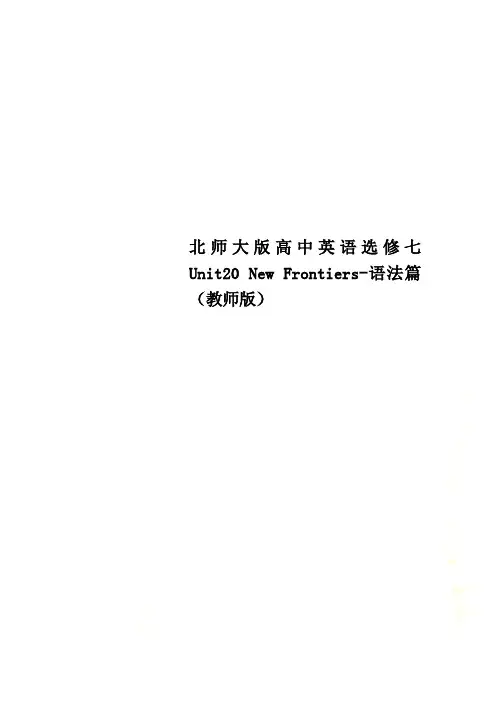
北师大版高中英语选修七Unit20 New Frontiers-语法篇(教师版)Unit20 New Frontiers-语法篇____________________________________________ __________________________________________________________________________________ ______________________________________通过本节课的学习掌握两大时态——将来进行时及将来完成时。
将来进行时一.将来进行时的基本结构基本结构是:主语+will be/be going to be +doing将来进行时的被动结构为:主语+will be/be going to being +doneDon’t phone me between 5and 6. We’ll having dinner then.五点至六点之间不要给我打电话,那时我们正在吃饭。
二.将来进行时的基本用法1.将来进行时是指将来某个时间正在进行的动作。
如:I will be sleeping at 12:00p.m. 十二点的时候我将在睡觉。
I will be studying in university at the age of 20.我20岁的时候我将会在大学里学习。
人所提及的某一将来时间。
如:We will have been married a year on June 25th. 到6月25日我们俩结婚就满1年了。
By this time next week, I will have been working for this company for 24 years. 到下星期此刻,我就已经为该公司干了24年了。
3. 表示“推测即表示根据某情况作出的推测。
如:That will have been Roland. He said he’d be back at 7. 准是罗兰。
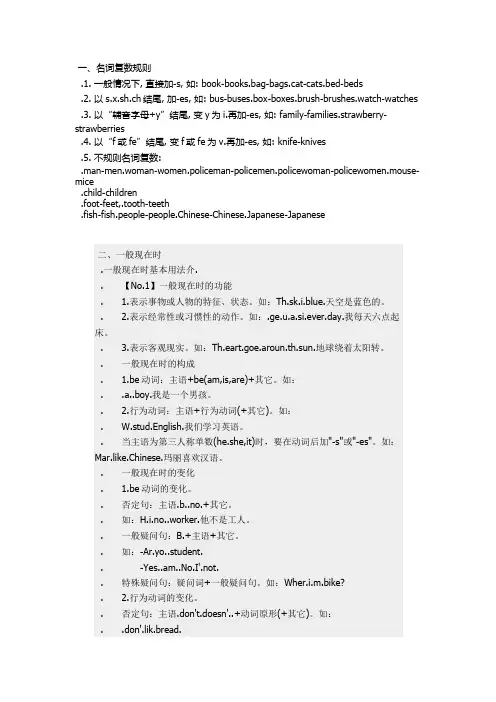
一、名词复数规则.1. 一般情况下, 直接加-s, 如: book-books.bag-bags.cat-cats.bed-beds.2. 以s.x.sh.ch结尾, 加-es, 如: bus-buses.box-boxes.brush-brushes.watch-watches .3. 以“辅音字母+y”结尾, 变y为i.再加-es, 如: family-families.strawberry-strawberries.4. 以“f或fe”结尾, 变f或fe为v.再加-es, 如: knife-knives.5. 不规则名词复数:.man-men.woman-women.policeman-policemen.policewoman-policewomen.mouse-mice.child-children.foot-feet,.tooth-teeth.fish-fish.people-people.Chinese-Chinese.Japanese-Japanese二、一般现在时.一般现在时基本用法介..【No.1】一般现在时的功能. 1.表示事物或人物的特征、状态。
如:Th.sk.i.blue.天空是蓝色的。
. 2.表示经常性或习惯性的动作。
如:.ge.u.a.si.ever.day.我每天六点起床。
. 3.表示客观现实。
如:Th.eart.goe.aroun.th.sun.地球绕着太阳转。
.一般现在时的构成. 1.be动词:主语+be(am,is,are)+其它。
如:..a..boy.我是一个男孩。
. 2.行为动词:主语+行为动词(+其它)。
如:.W.stud.English.我们学习英语。
.当主语为第三人称单数(he.she,it)时,要在动词后加"-s"或"-es"。
如:Mar.like.Chinese.玛丽喜欢汉语。
.一般现在时的变化. 1.be动词的变化。
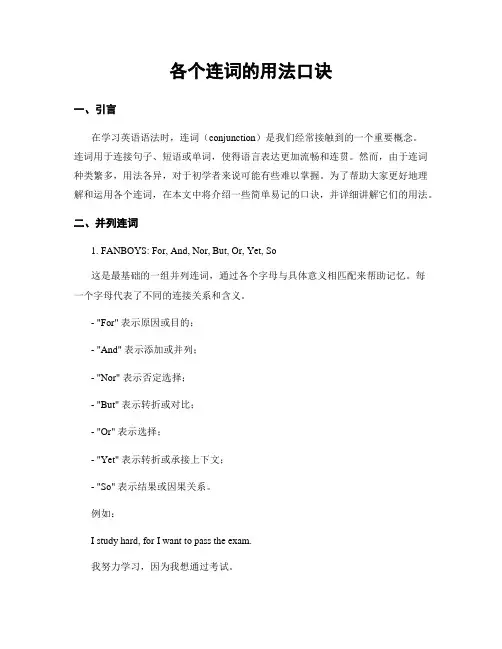
各个连词的用法口诀一、引言在学习英语语法时,连词(conjunction)是我们经常接触到的一个重要概念。
连词用于连接句子、短语或单词,使得语言表达更加流畅和连贯。
然而,由于连词种类繁多,用法各异,对于初学者来说可能有些难以掌握。
为了帮助大家更好地理解和运用各个连词,在本文中将介绍一些简单易记的口诀,并详细讲解它们的用法。
二、并列连词1. FANBOYS: For, And, Nor, But, Or, Yet, So这是最基础的一组并列连词,通过各个字母与具体意义相匹配来帮助记忆。
每一个字母代表了不同的连接关系和含义。
- "For" 表示原因或目的;- "And" 表示添加或并列;- "Nor" 表示否定选择;- "But" 表示转折或对比;- "Or" 表示选择;- "Yet" 表示转折或承接上下文;- "So" 表示结果或因果关系。
例如:I study hard, for I want to pass the exam.我努力学习,因为我想通过考试。
She is smart and diligent.她既聪明又勤奋。
He didn't come to the party, nor did he explain why.他没有来参加派对,也没有解释为什么。
2. A CAT EATS: Also, Consequently, Additionally, Therefore, Either, As Well, Then, Similarly这个口诀以"A CAT EATS"为首字母缩写,其中每一个字母代表了与连词相关的意义。
掌握了这些连词后,不仅能够提升语言的表达能力,还可以使文本更具连贯性。
- "Also" 表示补充信息;- "Consequently" 表示结果或因果关系;- "Additionally" 表示额外信息;- "Therefore" 表示因此或所以;- "Either" 表示两者之一选择;- "As Well" 表示同样地;- "Then" 表示时间或顺序关系;- "Similarly" 表示相似性。
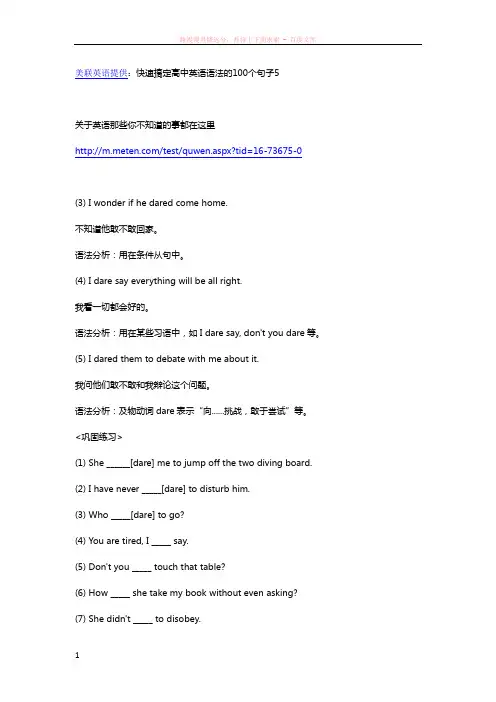
美联英语提供:快速搞定高中英语语法的100个句子5关于英语那些你不知道的事都在这里/test/quwen.aspx?tid=16-73675-0(3) I wonder if he dared come home.不知道他敢不敢回家。
语法分析:用在条件从句中。
(4) I dare say everything will be all right.我看一切都会好的。
语法分析:用在某些习语中,如I dare say, don't you dare等。
(5) I dared them to debate with me about it.我问他们敢不敢和我辩论这个问题。
语法分析:及物动词dare表示“向......挑战,敢于尝试”等。
<巩固练习>(1) She ______[dare] me to jump off the two diving board.(2) I have never _____[dare] to disturb him.(3) Who _____[dare] to go?(4) You are tired, I _____ say.(5) Don't you _____ touch that table?(6) How _____ she take my book without even asking?(7) She didn't _____ to disobey.<参考答案>(1) dared (2) dared (3) dares (4) dare (5) dare (6) dare (7) dare45. have的用法<例句>She has having them repaired.她正请人修理它们。
<语法分析>have这个词可以作助动词与其他词构成不同的时态,也可以作及物动词,有不同的实际含义。
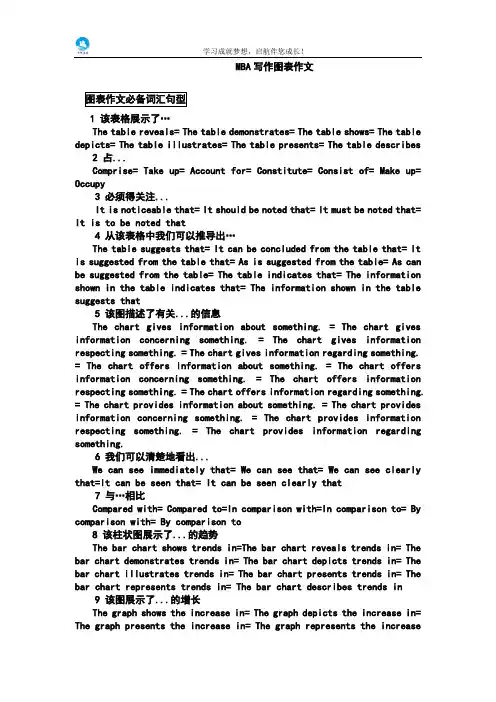
MBA写作图表作文图表作文必备词汇句型1 该表格展示了…The table reveals= The table demonstrates= The table shows= The table depicts= The table illustrates= The table presents= The table describes2 占...Comprise= Take up= Account for= Constitute= Consist of= Make up= Occupy3 必须得关注...It is noticeable that= It should be noted that= It must be noted that= It is to be noted that4 从该表格中我们可以推导出…The table suggests that= It can be concluded from the table that= It is suggested from the table that= As is suggested from the table= As can be suggested from the table= The table indicates that= The information shown in the table indicates that= The information shown in the table suggests that5 该图描述了有关...的信息The chart gives information about something. = The chart gives information concerning something. = The chart gives information respecting something. = The chart gives information regarding something. = The chart offers information about something. = The chart offers information concerning something. = The chart offers information respecting something. = The chart offers information regarding something. = The chart provides information about something. = The chart provides information concerning something. = The chart provides information respecting something. = The chart provides information regarding something.6 我们可以清楚地看出...We can see immediately that= We can see that= We can see clearly that=It can be seen that= It can be seen clearly that7 与…相比Compared with= Compared to=In comparison with=In comparison to= By comparison with= By comparison to8 该柱状图展示了...的趋势The bar chart shows trends in=The bar chart reveals trends in= The bar chart demonstrates trends in= The bar chart depicts trends in= The bar chart illustrates trends in= The bar chart presents trends in= The bar chart represents trends in= The bar chart describes trends in9 该图展示了...的增长The graph shows the increase in= The graph depicts the increase in= The graph presents the increase in= The graph represents the increasein= The graph reveals the increase in= The graph demonstrates the increase in= The graph illustrates the increase in= The graph describes the increase in10 大约Approximately=Almost=About=Around=Nearly=Roughly11 增长至...Grow to= Rise to=Increase to=Go up to=Climb to=Ascend to=Jump to=Shoot to12 降低至...Dip to=Fall to=Decline to=Decrease to= Drop to=Go down to= Reduce to= Slump to=Descend to=Sink to=Slide to13 一种急剧的增长A dramatic rise=A boom =A dramatic increase =A sharp rise=An upward trend=A sharp increase=A steep rise=A steep increase=A rapid leap=A sudden rise=A marked increase=A huge growth14 急剧地Dramatically=Drastically=Sharply=Hugely=Enormously=Steeply=Substa ntially=Considerably=Significantly=Markedly=Surprisingly=Strikingly= Radically=Remarkably=Vastly=Noticeably15 缓慢地Steadily=Smoothly=Slightly=Slowly=Marginally=Gradually=Moderatel y=Mildly16 保持稳定Level out=do not change=Remain stable=Remain still=Remain steady=Be stable=Maintain the same level=Remain unchanged=Be still= Remain the same level=Stay constant=Keep at the same level=Level off=Stabilize=Keep its stability=Even out17 起伏不定Fluctuate=Go ups and downs=Display a fluctuation=Demonstrate a fluctuation18 与之相反In contrast=By contrast=On the other hand=On the contrary= Conversely19 事实上Practically=In practice=Essentially=In essence=In reality=In effect=In fact=As a matter of fact=It is a fact that20 该图给出有关...的信息The graph gives information about…= The graph offers information about…=The graph provides information about…= The graph gives information regarding…= The graph offers information regarding…=The graph provides information regarding…= The graph gives information respecting…= The graph offers information respecting…=The graph provides information respecting…= The graph gives information concerning…= The graph offers information concerning…=The graph provides information concerning…21 如该图所示It is shown in the chart that= It is depicted in the chart that= It is demonstrated in the chart that= It is illustrated in the chart that= It is presented in the chart that= It is represented in the chart that= It is revealed in the chart that= The chart gives= The chart reveals= The chart demonstrates= The chart shows= The chart depicts= The chart illustrates= The chart presents= The chart represents= The chart describes=As is shown in the chart= As is depicted in the chart= As is presented in the chart= As is represented in the chart= As is demonstrated in the chart=As is revealed in the chart= As is illustrated in the chart22 从...急剧地增长到...Increase dramatically from…to…= Increase drastically from…to…= Increase sharply from…to…= Increase hugely from…to…= Increase enormously from…to…= Increase steeply from…to…= Increase substantially from…to…=Increase considerably from…to…=Increase significantly from …to…=Increase markedly from…to…=Increase surprisingly from…to…=Increase strikingly from…to…=Increase radically from…to…=Increase remarkably from…to…=Increase vastly from…to…=Increase noticeably from...to…23 由这些数据我们可以推导出The figures indicate= The figures suggest=It can be indicated from the figures that=It can be suggested from the figures that=It can be concluded from the figures that= As can be indicated from the figures =As can be suggested from the figures =As can be concluded from the figures=The statistics indicate= The statistics suggest=It can be indicated from the statistics that=It can be suggested from the statistics that=It can be concluded from the statistics that= As can be indicated from the statistics =As can be suggested from the statistics =As can be concluded from the statistics24 由该表格我们可以清楚地看出:...的数字发生了巨大的变化It is obvious in the table that the number of… has undergone dramatic changes= It is clear in the table that the number of… has undergone dramatic changes= It is apparent in the table that the number of… has undergone dramatic changes= It is manifest in the table that the number of… has undergone dramatic changes25 通过分析这两个图,我们可以清楚地看出By analyzing the two charts, we can see that= By analyzing the two charts, we can see clearly that= By analyzing the two charts, we can conclude that26 换言之In other words=To put it like this=To put it differently=To put it from another way= To put it from another angle27 因此So=therefore=thus=hence=consequently=as aconsequence=accordingly=as a result=because of this=as a result of this28 明显的Clear=obvious=evident=self-evident=manifest=apparent=crystal-clear 图表作文满分范文示例第一篇:1. 描述上图所示的手机用户数的变化情况2. 出现这种情况的原因3. 对此现象进行评价As is shown in the bar chart, cell phones become increasingly popular in China. In 1999, the number of cell phones in use was only 2 million, while in 2002, the number soared to 5 million. In 2005, the figure reached its peak at 9 million.This phenomenon can attribute to diverse factors. Firstly, easy accessibility of cell phones accounts for their increase. Another merit is that they provide people with unlimited entertainment, from enjoying music to watching movies and from playing games to sending MMS. Last of all, the drop in price makes mobile phones’ popularity possible.Obviously, this development has both advantages and disadvantages. On the one hand, the wide use of cell phones makes our day-to-day lives more colorful, convenient and comfortable. However, on the other hand, overdependence on mobile phones may give rise to numerous problems, such as invasion of privacy, psychological illnesses, isolation of people’s relationships, to name just a few.第二篇:Year 2000 2005 2009Traveling 37% 51% 76%Staying at home 63% 49% 24%1、根据上表,简要描述2000年、2005年、2009年某城市人们度假方式的情况及其变化2、请说明发生这些变化的原因3、你的观点As is shown clearly in the table,there was a noticeable change in the way people spent their holidays from 2000 and 2009.In 2000, 63% of people spent their holidays at home, while the figure decreased considerably to 24% in 2009. At the same time, the number of people choosing traveling rose sharply from 37% in 2000 to 76% in 2009.The following reasons should be mentioned. To begin with, people can now earn more money than they used to, making it possible for them to afford traveling expenses. In addition, people realize the importance of getting well-informed about the outside world in this ever-accelerated era, and traveling provides them with a good opportunity to broaden their horizons.So, it becomes increasingly popular.As far as I am concerned, traveling is always better than staying at home during holidays. Not only does it add spice to our lives, but it easesthe mind and body as well.MBA写作书信作文九类书信黄金句型背诵(一)询问信询问信开头常用句式I would be grateful if you could send me information about...I am writing to see if it is possible for you to provide me with information about...I am writing to ask you if/whether......I am writing to ask if it is possible for you to do something.I wonder if you could tell me......I would like to request some information about...I am greatly concerned about...询问信结尾常用句式I am looking forward to your prompt response.Your prompt attention to this letter would be highly appreciated.I am looking forward to a favorable reply.I would appreciate your advice on such matters.I am looking forward to hearing from you.I am looking forward to a favorable reply at your earliest convenience. Thank you for your consideration and I will be looking forward to your reply.(二)感谢信感谢信开头常用句式I am writing to express my sincere gratitude for...I would like to express in this letter my heartfelt thanks to you for...I am writing to express my appreciation of your...I am grateful to you for...I truly appreciate your kindness.I can never thank you enough.I wish there were a better word than “thanks “to express my appreciation for your generous help.感谢信结尾常用句式I must thank you again for your generous help.Thank you from the bottom of my heart for...Again, I would like to express our sincere thanks to you.Many thanks for your kindness and hospitality.Thank you again for your kindness.(三)邀请信邀请信开头常用句式I am writing to invite you to...I am writing to ask whether you would be willing to attend...I wonder if you could come to...邀请信结尾常用句式I would feel honored if you could come to...I am looking forward to your participation in...I really hope you can make it.We sincerely hope that you can make it.We would be honored to have you there with us.We would be looking forward to your participation in the party. The honor of your presence is requested.(四)道歉信道歉信开头常用句式I am terribly sorry that......I am writing to apologize for...I must apologize to you for...I regret to inform you that......I am writing to say sorry for...道歉信结尾常用句式I sincerely hope that you will accept my apologies.Please accept my sincerest and deepest apology.Once again, I am sorry for any inconvenience caused by it.I hope you will excuse me for my carelessness.Thanks for your understanding.I sincerely hope that you will be able to think in my position and accept my apologies.I apologize most sincerely for...I owe you an apology.I am so sorry to have put you through so much trouble.(五)申请信申请信开头常用句式I am writing this letter to inquire about the entrance to your university.I am writing this letter to inquire about the possibility of being accepted as a student in your university.I am very interested in exploring the possibility of obtaining a position as a...I am writing to express my interest in your recently advertised position for a...I write this letter to apply for the position that you have advertised in...I hope you will be kind enough to consider my application favorably. Thank you for considering my application and I am looking forward to hearing from you.If you need to know more about me, please contact me at...If further materials are required, I am quite willing to forward them to you.I am looking forward to a favorable reply at your earliest convenience. Thanks for your consideration.Thank you for your consideration and I will be looking forward to your reply.(六)建议信建议信开头常用句式I am writing to express my views about...You have asked me for my advice on...and I will try my best to make some conductive suggestions.表达建议常用句式If I were you, I would do something.I hope you will not find it too forward for me to suggest that you...... In my experience, it seems that ...would make sense in this situation.I think it would be beneficial if something be done.It would seem to me that you could do something.As you may agree, ......In my humble opinion, you would be wise to take the following action:Please let me know if I can help furtherI would be ready to discuss this matter to further details(七)投诉信投诉信开头常用句式I am writing to you to complain about...I am writing to express my dissatisfaction with...I am writing to make a complaint about...I am writing to place a complaint against...I am writing to complain about...I feel bad to trouble you, but I am afraid that I have to make a complaint about...I am writing to inform you that I am dissatisfied with your...I regret to inform you that...投诉信结尾常用句式I appreciate it very much if you could do something.I would be grateful if you could do something.I hope to hear from you soon.I hope this would be solved within ...I expect to be further informed about this issue.I understand you will give immediate attention to this matter.I would like to have this matter settled by the end of...I feel something ought to be done about...I hope that the above situation will be improved as soon as possible. Your effort to provide good services will be highly appreciated by all.I am looking forward to a favorable reply at your earliest convenience. Thank you for your consideration and I will be looking forward to your reply.(八)推荐信推荐信开头常用句式I am writing to recommend......I would like to present ...for your consideration in your search for a... With reference to your requirements, I shall, without reservation, recommend ...as an ideal candidate.推荐信结尾常用句式Therefore, I think...is worthy of your serious consideration. Therefore, I do not hesitate to recommend ...as the right person for your consideration.I therefore recommend...without any reservation.Any favorable consideration to this letter would be considered a personal favor.(九)请求信请求信开头常用句式I am writing to ask whether you can help me with...I am writing to seek for your assistance in...I am writing to formally request to...请求信结尾常用句式I am looking forward to a favorable reply at your earliest convenience.I would like to thank you for your generous help in this matter. Thank you for your consideration and I will be looking forward to yourreply.Thank you for your attention to these requests.I look forward to a favorable reply.C.书信高分范文实例1.Your neighbors have recently written to you to complain about the noisefrom your house flat. Write a letter to your neighbors. In your letter . explain the reasons for the noise. apologize.describe what action you will takeYour letter should be no less than 100 words. You don't need to write the address. Don't sign your own name at the end of the letter, use Richardinstead.Begin your letter as follows:Dear………………,Dear Toms,I am writing to apologize for the noise from my flat. I did not realize that it had spoiled your evenings and made you nervous. If I had known that, I would have stopped it. So, I do hope you can accept my sincereapologies.As you may guess, there is something wrong with the door in my living room. I try to fix it in the evenings everyday I get home from work. It is unfortunate that I am not good at fixing so it takes longer than Iexpected, which gave rise to so much noise. I regret to say that until now, the door is still out of work. But I have decided to call in a professional builder who, as I see it, will finish the rest work in no more than three days. I promise that he will only work during daytime,and you will not be disturbed in the evenings again.Once again, I am sorry for any inconvenience caused by it.Richard.2. A night club just opened near your home. You are very unhappy about the situation because it disturbs the peace of the neighborhood. Write a letter to your local government official. Say who you are and explainwhy you are unhappy and suggest what should be done about it.Your letter should be no less than 100 words. You don't need to write the address. Don't sign your own name at the end of the letter, use Dick instead. Begin your letter as follows:Dear sir/madam,Dear sir/madam,I am writing to make a complaint about the head-scratching puzzlementI have been confronted with recently.I am resident of St. Pancreas Street and I have been living here for at least 15 years. The tranquility here was appealing to me, but now, it is totally destroyed by a night club near my home. Every evening, the noise from that club drives me crazy and I cannot go to sleep. It is no overstatement to say that a sound sleep seems to be my golden memory. As a teacher, I cannot devote myself to my routine job just because ofpoor-quality sleep. Sounds ridiculous? It’s true.I am writing thisletter to ask if it is possible for you to make some change. If you could ensure that the noise in that club would be in a minimum level at night,I would be most grateful.Thank you for your consideration and I will be looking forward to yourreply.Sincerely Yours,Dick.3.You hope to further your study in Cambridge University upon your graduation next year. Now you are writing to the office of graduate admissions to ask for the Application Form and other relative materials.In your letter. your personal information. the reason why you choose Cambridge University. a brief study plan Your letter should be no less than 100 words. You don't need to write the address. Don't sign your own name at the end of the letter, use Anthow instead.Begin your letter as follows:Dear sir/madam,Dear Sir or Madam,I am writing in the hope that I may obtain an opportunity to further mystudy in English Literature toward master degree in your university. My name is Anthow, an undergraduate student of the Department of English,Beijing Foreign Studies University (China). Next year in the summer, I will graduate and get my BA degree. I plan to continue my study and research in this field under the instructions of first-class professors and in a dynamic academic atmosphere. I choose Cambridge University because there are a congenial team of researchers, an array of databases and research projects in your School of English. I believe my interests are extremely congruent with the strengths of the School. And my solid academic background will meet your general entrance requirements forgraduate study.I will appreciate it very much if you could send me the Graduate Application Forms, the Application Form for Scholarships/Assistantships, a detailed introduction to the School of English, and other relevantinformation. My mailing address is shown on the top of this letter.I am looking forward to hearing from you soon.Sincerely yours,Anthow.4.You want to invite Mr. Williams to give a lecture on "American literature" in your college. Supposed you are the assistant of the English department, write a letter and say: 1) the purpose of theinvitation. 2) the time of the lecture. Your letter should be no less than 100 words. You don't need to write the address. Don't sign your own name at the end of the letter, use Linda instead.Dear Mr. Williams,I am writing on behalf of the English Department to invite you togive a lecture in our college. We know that you are an expert on American literature. As English majors, our students would like to know somethingabout American literature. We would be very grateful if you could give a talk on "Contemporary American Literature" to students of the English Department on Saturday, June 4. If this subject does not suit you, any other similar topic would be welcome as well.We have already had several very interesting talks from some distinguished visitors from various countries and we look forward early to the opportunity to benefit from your experience and wisdom.Yours truly,Linda5.While your family was on vacation, your friend, Cathy looked after your dog, smart. Now you came back, write a letter to her to show your gratitude. Your letter should be no less than 100 words. You don't need to write the address. Don't sign your own name at the end of the letter, use Emily instead.Dear Cathy,I am writing to express our heartfelt thanks for taking good careof smart while we were on holiday. He was such a happy dog when we got home; we knew he must have had lots of loving attention. When we used to pick up from the kennel he would whimper and carry on for hours.You not only saved us some money, you also spared us the worry of how he was doing while we were away. Your kind help is very much appreciated, not only by smart, but also by our whole family as well. Yours truly,Emily6.One of your pen friends, John, will be visiting your city. However, for some reasons, you can not meet him at the airport on time. Write a letter asking to wait for you at the airport and tell him how to recognize you. Your letter should be no less than 100 words. You don't need to write the address. Don't sign your own name at the end of the letter, use Alice instead.Dear John,I am eagerly looking forward to your visit to our city. After allthese years of writing to each other, I can not wait to see you. However, I regret to inform you that I will not be able to meet you at the airport on time.The reason is that your flight will arrive early in the morning,and the earliest I can reach the airport will be about an hour after you land. Will you please wait for me in the arrival lounge? You can have breakfast while you wait.By the way, as we have never met I must tell you home to identify me: I am of 165cm tall and have a long hair. In addition, I will wear a white skirt and carry a China Daily at hand.Hope we can meet soon.Sincerely yours,Alice7.Your friend Jack has got his master's degree. Write a letter to show your congratulations. Your letter should be no less than 100 words. You don't need to write the address. Don't sign your own name at the end ofthe letter, use Wang Li instead.Dear Jack,Heartfelt congratulations on your graduation from the Graduate School.I have good reasons to feel proud of you. I know the degree of mastermeant many years of assiduous study and hard work. Now you have come through with flying colors and high honors. I have heard of your excellent record in research and extra curricular activities. In this you took the right road to emerge as a fully developed young man to society.I take pride in your achievements and avail myself of this opportunity to extend to you my best wishes for your success and happiness.Yours sincerely,Wang Li8.One of your friends Mary Brown is going to enter Mr. Johnson’s school after her graduation. Write a letter to Mr. Johnson to introduce her. Your letter should be no less than 100 words. You don't need to write the address. Don't sign your own name at the end of the letter, use Emma instead.Dear Mr. Johnson,I take great pleasure in introducing Mary Brown one of my classmatesand best friends to you. She is going to pursue her education as a postgraduate in your university after her graduation here. She and I had lived and studied together for four years. No friend deserves so muchlove and respect as she does. Now that we have finished our study here we had to part with each other.Will you please give her some guidance in regard to the entranceexamination? Any information you can provide, as well as your introduction for him to meet the future tutor shall be appreciated very much.Yours truly,Emma9.You want to apply for a job as a personal secretary to the general manager of a company. Write a letter to the Human Resources Department of that company offering your services. Your letter should be no less than 100 words. You don't need to write the address. Don't sign your own name at the end of the letter, use Anita instead.Dear Sir or Madam,I am writing to express my interest in your recently advertised position for a personal secretary to the general manager. I am fully confident that I am the right person for the job.I know that my future boss have lots of work each day, however,it is exactly the challenge inherent in my perspective job that attracts me and makes me to submit this application to you. I have worked as the private secretary in an insurance company for two years and gained many experiences. I believe my qualifications and work experiences will combine to produce an excellent work performance.I would like to meet you to discuss the possibility of working in your company at a continent time. I can be reached at 8976-5678.Thank you for considering my application. Please contact me at your earliest convenience.Yours sincerely,Anita10.Your local library intends to improve its service and facilities. Asa regular library use, please write a letter to the chief librarian, offering your suggestions. Your letter should be no less than 100 words. You don't need to write the address. Don't sign your own name at the end of the letter, use Donna instead.Dear Sir or Madam,I am glad to hear that the library is to take some measures to improve its service and facilities. So I am writing to offer my proposals.We all know that libraries play a vital role in the education andentertainment of the general reader. In my opinion, our library should do its best to purchase the latest publications as well as make sure that it has a full set of classical and reference works. Another important facility I suggest is the Internet via computers. In this way, the library will expand its services to a larger number of readers.All in all, I think a library should take all necessary measures to keep up with the times. I will highly appreciate your consideration of my proposals.Yours sincerely, Donna11.You found something wrong with the telephone bill you have received from the local post office. You made a call to inquire about this; however the person who answered the call was very rude. Write a letter of complaint to the manager of the post office, explaining the situation and giving your suggestions for improvement. Your letter should be no less than 100 words. You don't need to write the address. Don't sign your own name at the end of the letter, use Donna instead.Dear Sir,I am writing to let you know the deplorable attitude of one of yourstaff member. I received my telephone bill for the previous month from you and thought there were some errors in calculation: I had been overcharged for two overseas calls.However, when I called your Complaints Department, the girl whoanswered my phone was very rude. For one thing she interrupted me continually, for another she even said that the fault was my own. Needless to say, such a way of dealing with customers is unacceptable.I would like to suggest that the girl in question should be disciplined, and instructed on the proper way to deal with clients. And I hope she can make formal apology to me.An early response will be appreciated.Sincerelyyours,Donna12.You are going to study at a foreign university. Write a letter inquiring about the specific information as regards accommodation, fees and qualifications there. Your letter should be no less than 100 words.。
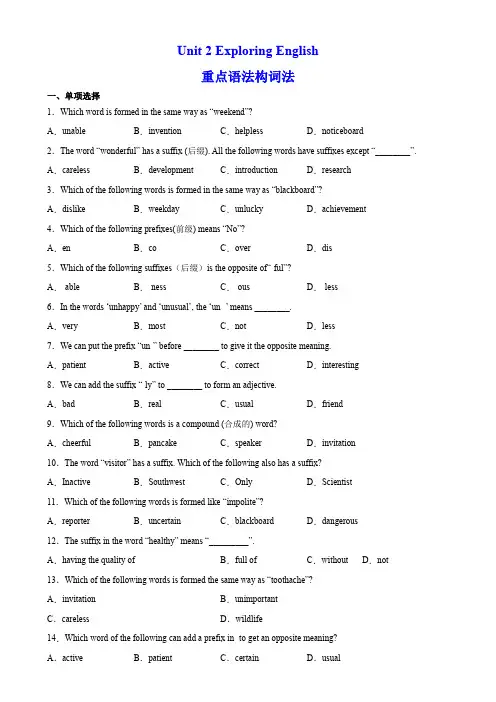
Unit 2 Exploring English重点语法构词法一、单项选择1.Which word is formed in the same way as “weekend”?A.unable B.invention C.helpless D.noticeboard2.The word “wonderful” has a suffix (后缀). All the following words have suffixes except “________”. A.careless B.development C.introduction D.research3.Which of the following words is formed in the same way as “blackboard”?A.dislike B.weekday C.unlucky D.achievement4.Which of the following prefixes(前级) means “No”?A.en- B.co- C.over- D.dis-5.Which of the following suffixes(后缀)is the opposite of“-ful”?A.-able B.-ness C.-ous D.-less6.In the words ‘unhappy’ and ‘unusual’, the ‘un -’ means ________.A.very B.most C.not D.less7.We can put the prefix “un-” before ________ to give it the opposite meaning.A.patient B.active C.correct D.interesting8.We can add the suffix “-ly” to ________ to form an adjective.A.bad B.real C.usual D.friend9.Which of the following words is a compound (合成的) word?A.cheerful B.pancake C.speaker D.invitation10.The word “visitor” has a suffix. Which of the following also has a suffix?A.Inactive B.Southwest C.Only D.Scientist11.Which of the following words is formed like “impolite”?A.reporter B.uncertain C.blackboard D.dangerous12.The suffix in the word “healthy” means “_________”.A.having the quality of B.full of C.without D.not 13.Which of the following words is formed the same way as “toothache”?A.invitation B.unimportantC.careless D.wildlife15.Which one of the following words will be like “really” after adding “-ly”?A.week B.usual C.friend D.love16.Which of the following suffixes(后缀)means “without”?A.-ful B.-less C.-ly D.-tion17.Which of the following words can’t be added with a prefix ‘‘un-’’?A.correct B.necessary C.interesting D.important18.Which of the following words has a different prefix (前缀)to make it have an opposite (相反的)meaning? A.happy B.possible C.kind D.healthy19.We can put the prefix “un—” before the following words to give them the opposite meaning EXCEPT________.A.happy B.cost C.certain D.important20.Which of the following words is created in the same way as “careless” ?A.wonderful B.impatient C.dishonest D.unhappy21.Which of the following prefixes(前缀) means “doing again”?A.en- B.dis- C.un- D.re-22.The following words all have the negative prefixes (否定前缀) EXCEPT ________.A.indoor B.unhappy C.inexpensive D.impossible23.Which of the following words is formed like “unimportant”?A.incorrect B.afternoon C.scientist D.hopeful24.The word “careless” has a suffix. Which of the following word does NOT have a suffix?A.careful B.visitor C.meaning D.certain25.Which of the following is NOT a compound word (合成词)?A.railway B.tour C.housework D.grandson26.Which word can NOT be added the prefix “in-” to give it the opposite meaning?A.complete B.direct C.correct D.proper27.Which of the following words is created in the same way as “blackboard”?A.careless B.impolite C.happiness D.bookshop28.We can put “un-” before the following words except _________.A.correct B.comfortable C.certain D.interesting29.Eiffel Tower is a famous landmark in Paris. Which of the following words is created in the same way as the word “landmark”?30.We can put two words together to create new words. They are called compound words (复合词). Which of the following is not a compound word?A.blackboard B.earphones C.meaningful D.homework31.We cannot add 'un-' to________to give it the opposite meaning.A.possible B.happy C.interesting D.friendly32.Which of the following words has a different prefix to make it have an opposite meaning?A.usual B.polite C.friendly D.certain33.Which of the following suffixes(后缀)means "without"?A.–able B.–ful C.–ous D.–less34.Which of the following words is formed like “impossible”?A.reporter B.blackboard C.dishonest D.harmless35.Which of the following words CAN NOT add the suffix “er” to form a noun?A.speak B.play C.farm D.visit36.Which of the following suffixes is used to form an adjective?A.-less B.-ness C.-tion D.-ion37.The suffix in the word healthy means “__________________”.A.not B.full of C.without D.having the quality of38.Which of the following suffixes is used to form an adjective?A.-less B.-ness C.-tion D.-ment39.He found it unnecessary for us to stay behind. In this sentence, the underlined word “unnecessary” means “________”.A.not patient B.not necessary C.not important D.not tiring40.Which of the following words can NOT be added the prefix "un-" to give it the opposite meaning? A.happy B.healthy C.usual D.polite41.Which of the following words is formed like "handbag"?A.meaningful B.snowman C.protection D.impatient42.Which of the following words is formed like "homework"?A.inventor B.raincoat C.dishonest D.careless43.Which of the following suffixes CANNOT be used to make a noun?A.-less B.-ness C.-tion D.-ment44.In the words homeless and useless, the -less means ______.45.Which of the following words is created in the same way as pancake?A.impolite B.surface C.German D.playground 46.Which of the following suffixes CANNOT be used to make a noun?A.less B.ness C.tion D.ment47.Which word can’t we add “or” to form a noun for a person?A.invent B.visit C.direct D.paint48.Which of the following suffixes(后缀)means "without"?A.—able B.—ful C.—ous D.—less49.Which of the following words has the same word formation as the word “snowstorm”? A.helpless B.incorrect C.government D.blackboard 50.Which of the following words has a different prefix (前缀) to make it have an opposite meaning? A.happy B.correct C.interesting D.certain参考答案:1.D【详解】句意:哪一个单词的构成方式与“weekend”的构成方式相同?考查构词法。
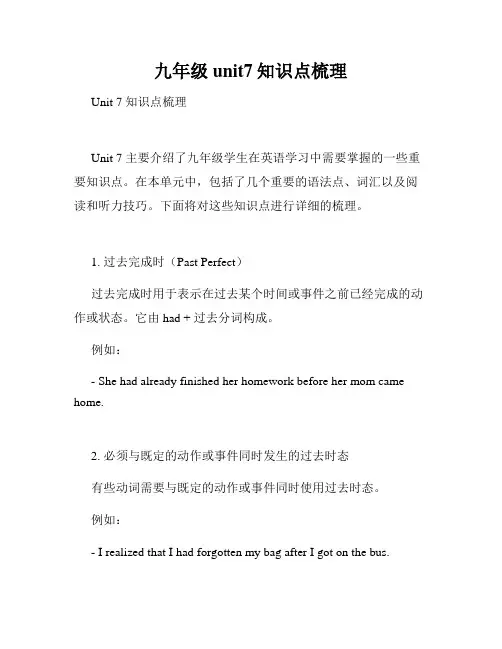
九年级unit7知识点梳理Unit 7 知识点梳理Unit 7 主要介绍了九年级学生在英语学习中需要掌握的一些重要知识点。
在本单元中,包括了几个重要的语法点、词汇以及阅读和听力技巧。
下面将对这些知识点进行详细的梳理。
1. 过去完成时(Past Perfect)过去完成时用于表示在过去某个时间或事件之前已经完成的动作或状态。
它由had + 过去分词构成。
例如:- She had already finished her homework before her mom came home.2. 必须与既定的动作或事件同时发生的过去时态有些动词需要与既定的动作或事件同时使用过去时态。
例如:- I realized that I had forgotten my bag after I got on the bus.3. 含有宾语从句的宾语从句要使用过去完成时当宾语从句中的动作发生在主句中所描述的过去动作之前时,需要使用过去完成时。
例如:- She said that she had never been to Paris before.4. 反意疑问句(Tag Questions)反意疑问句用于对陈述句进行确认或否定。
通常使用肯定陈述句 + 否定疑问词构成。
例如:- You have read the book, haven't you?5. 带有否定词的特殊疑问句带有否定词的特殊疑问句常用于询问具体情况或原因,并使用"why" 或 "how" 开头。
例如:- Why didn't you attend the party?6. 非谓语动词的过去完成时过去完成时的非谓语动词结构为 "having + 过去分词" 。
例如:- Having finished his homework, he went to bed.7. 词汇在Unit 7中,我们还学习了一些与城市和环境相关的词汇。
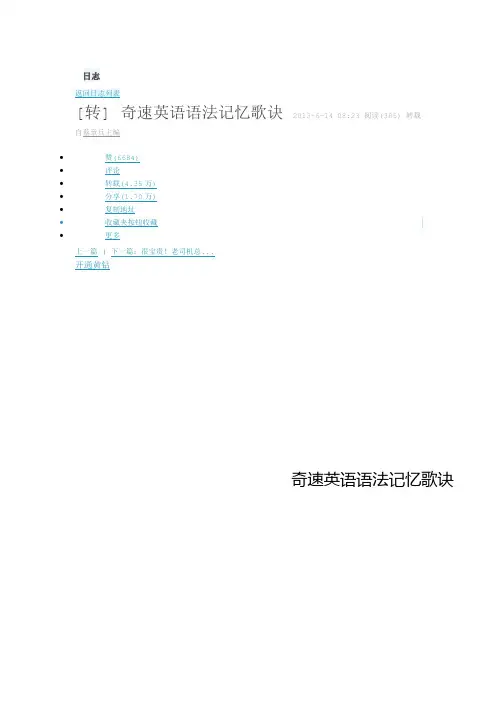
日志[转] 奇速英语语法记忆歌诀2013-6-14 08:23阅读(385)转载自蔡章兵主编•赞(6684)•评论•转载(4.35万)•分享(1.70万)•复制地址•收藏夹按钮收藏•更多上一篇 | 下一篇:很宝贵!老司机总...开通黄钻奇速英语语法记忆歌诀语法是英语学习中的基础、也是十分重要的一个部分,学好语法才能写出漂亮的英语作文,下面这写关于英语语够帮到在语法之海中苦渡的你哟~!一、一般现在时一般现在时态中,动词一般用原形。
表述事实讲真理,习惯动作常发生。
动词词尾加-s(es),只表单数三人称。
若变一般疑问句,得看句型是哪种。
系表结构和there be, be放句首可完成;若遇实义动词句,do或does莫忘用!二、现在进行时Look, Listen是标志,现在进行正发生;有时now在句中现,“be+v-ing”时态成。
若问be用何形式,须看主语数、人称。
He /She is, I am.We, you, they后are紧跟。
v-ing形式更好记,三种构成要分清。
一般问句be提前,be后加not否定成!三、基数词变序数词基变序,很容易,一二三,特殊记,th从四起。
八去t来九去e,遇到ve,f替,ty变为tie,后加th莫迟疑,若想四、时间介词巧记歌年、月、季节前须用in,(如:in 2008, in September, in spring)日期前面行不通。
遇到几号改用on,(如:on January 1)上午、下午、晚上仍用in。
(如:in the morning/afternoon/evening)若是某日上下午,也是用on才能行。
(如:on the evening of the Mid-autumn Day) 正午、夜里用at,(如:at noon, at night) 时、分用法也同理。
(如:, at two, at two)如若“差”点须加to,(如:two to two)如若“过”点改past。
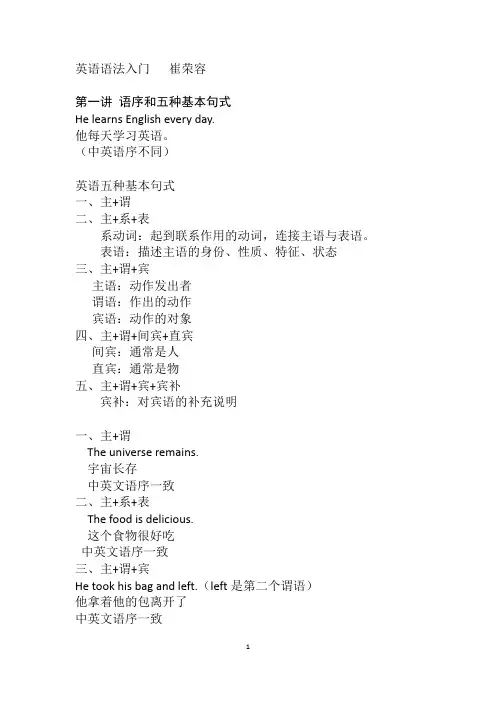
英语语法入门崔荣容第一讲语序和五种基本句式He learns English every day.他每天学习英语。
(中英语序不同)英语五种基本句式一、主+谓二、主+系+表系动词:起到联系作用的动词,连接主语与表语。
表语:描述主语的身份、性质、特征、状态三、主+谓+宾主语:动作发出者谓语:作出的动作宾语:动作的对象四、主+谓+间宾+直宾间宾:通常是人直宾:通常是物五、主+谓+宾+宾补宾补:对宾语的补充说明一、主+谓The universe remains.宇宙长存中英文语序一致二、主+系+表The food is delicious.这个食物很好吃中英文语序一致三、主+谓+宾He took his bag and left.(left是第二个谓语)他拿着他的包离开了中英文语序一致四、主+谓+间宾+直宾Her father bought her a dictionary. buy sb sth(双宾语)她爸爸给她买了一本词典(her与a dictionary,两个宾语,一个是人、一个是物)中英文语序一致五、主+谓+宾+宾补We made him our monitor.我们选他当班长(him与our monitor,都是指同一个人,our monitor是对him 的补充说明)中英文语序一致Nothing is impossible to a willing heart!有志者事竟成!第二讲 be动词的形式和用法一、be动词的形式:be、am、is、are、was、were、being 、been1、The man is back.2、They are back.3、He was back.4、They were back.5、They have been back.6、I’ll be back.上述“back”是副词,构成主系表结构。
二、be动词的用法:起到联系前后的作用(一般翻译为“是”,或无实意而不作翻译),多用于主系表结构。

高中英语语法记忆顺口溜Modified by JACK on the afternoon of December 26, 2020高中英语语法记忆顺口溜教你巧学巧记:句子成分巧划分英语简单句共有五种基本句型。
成千上万个英语句子都是这五种句型的扩大或缩小演变而成的。
英语句子成分的划分方法与汉语大不相同,尤其是谓语部分更复杂。
因为英语动词有四大类,而且各类动词的功能也不尽相同。
下面我们就划分英语句子成分的方法,利用口诀加实例的形式进行综述:主在前、谓在中,宾语、状语后面冲①。
短语定语主宾后,形、代定语主宾前②。
间宾直宾紧相依,直、间之间to、for连③。
宾补位于宾语后,地状常在时状前④。
例1. We are going to have physics next term.主语(在句首) 谓语(在句子中间) 宾语状语(在句子末尾)上述句子成分的划分用上了第①句口诀,结合上述句子剖析口诀①:(A)主在前:指主语常位于一个句子的前面(即句首); (B)谓在中:指谓语常位于一个句子的中间(尤其指主要谓语动词);(C)宾语、状语后面冲:指宾语、状语位于句子的尾部,好像打仗兵、卒在后面冲一样。
例2. Our politics teacher often tells us(物主代词作)定语主语 (副词作)状语谓语 (人作)间宾a story about Comrade Lei Feng on Saturdays.(事物作)直宾语 (介词短语作后置)定语状语上面这个句子成分的划分用上了口诀第②句和第③句,现将这两句口诀解释如下:(A)短语定语主宾后:指介词短语或其他短语在句中作定语常放在主语或宾语的后面。
如上句中的about Comrade Lei Feng作定语就是在宾语a story的后面。
(B)形、代定语主宾前:指形容词、代词作定语常位于一个句子的主语或宾语的前面。
如上句中our这个形容词性物主代词就放在politics teacher前面作定语。
太奇名师齐辙解析2015管理类联考英语完形真题试题:In our contemporary culture, the prospect of communicating with –or even looking at – a stranger is virtually unbearable. Everyone around us seems to agree by the way they cling to the phones, even without a __1__ on a subway.It’s a sad reality – our desire to avoid interacting with other human beings –because there’s __2__ to be gained from talking to the stranger standing by you. But you wouldn’t know it, __3__ into your phone. This universal protection sends the __4__:”Please don’t approach me.”What is it that makes us feel we need to hide __5__ our screens?One answer is fear, according to Jon Wortmann, an executive mental coach. We fear rejection, or that our innocent social advances will be __6__ as “weird.” We fear we’ll be __7__. We fear we’ll be disruptive.Strangers are inherently__8__to us, so we are more likely to feel__9__when communicating with them compared with our friends and acquaintances. To avoid this uneasiness, we_ 10_ to our phones.” Phone s become our security blanket,” Wortmann says.” They are our happy glasses that protect us from what we perceive is going to be more __11___”But once we rip off the band-aid, tuck our smartphones in ourpockets and look up, it doesn’t ___12___so bad. In one 2011 experiment, behavioral scientists Nicholas Epley and Juliana Schroeder asked commuters to do the unthinkable: Start a __13___. They had Chicago train commuters talk to their fellow __14___.”When Dr. Epley and Ms.Schroeder asked other people in the same train station to __15___how they would feel after talking to a stranger, the commuters thought their __16___ would be more pleasant if they sat on their own,” The New York Times summarizes. Though the participants didn’t expect a positive experience, after they __17__with the experiment,” not a single person reported having been embarrassed”__18__, these commutes were reportedly more enjoyable compared with those without communication, whichmakes absolute sense, ___19___human beings thrive off of social connections. It’s that ___20___: Talking to strangers can make you feel connected.选项及答案:1. [A]signal [B]permit [C]ticket [D]record2. [A]nothing [B]little [C]another [D]much3. [A]beaten [B]guided [C]plugged [D]brought4. [A]sign [B]code [C]notice [D]message5. [A]under [B]behind [C]beyond [D]from6. [A]misapplied [B]mismatched [C]misadjusted [D]misinterpreted7. [A]replaced [B]fired [C]judged [D]delayed太奇教育8. [A]unreasonable [B]ungrateful [C]unconventional [D]unfamiliar9. [A]comfortable [B]confident [C]anxious [D]angry10. [A]attend [B]point [C]take [D]turn11. [A]dangerous [B]mysterious [C]violent [D]boring12. [A]hurt [B]resist [C]bend [D]decay13. [A]lecture [B]conversation [C]debate [D]negotiation14. [A]passengers [B]employees [C]researchers [D]trainees15. [A]reveal [B]choose [C]predict [D]design16. [A]voyage [B]ride [C]walk [D]flight17. [A]went through [B]did away [C]caught up [D]put up18. [A]In turn [B]In fact [C]In particular [D]In consequence19. [A]unless [B]since [C]if [D]whereas20. [A]funny [B]logical [C]simple [D]rare原文及答案:While the subway's arrival may be ambiguous, one thing about your commute is certain: No one wants to talk to each other. In our contemporary culture, the prospect of communicating with -- or even looking at -- a stranger is virtually unbearable. Everyone around us seems to agree by the way they fiddle with their phones, even without a 1 signal underground.It's a sad reality -- our desire to avoid interacting with other human beings -- because there's 2 much to be gained from talking to thestranger standing by you. But you wouldn't know it,3 plugged into your phone. This universal armor sends the 4 message: 'Please don't approach me.'What is it that makes us feel we need to hide 5 behind our screens?One answer is fear, according to Jon Wortmann, executive mental coach and author of 'Hijacked by Your Brain: How to Free Yourself When Stress Takes Over.' We fear rejection, or that our innocent social advances will be 6 misinterpreted as 'creepy,' he told The Huffington Post. We fear we'll be 7 judged. We fear we'll be disruptive.Strangers are inherently8 unfamiliar to us, so we are more likely to feel 9 anxious when communicating with them compared with our friends and acquaintances. To avoid this anxiety, we 10 turn to our phones. 'Phones become our security blanket,' Wortmann says. 'They are our happy glasses that protect us from what we perceive is going to be more 11 dangerous.'But once we rip off the bandaid, tuck our smartphones in our pockets and look up, it doesn't12 hurt so bad. In one 2011 experiment, behavioral scientists Nicholas Epley and Juliana Schroeder asked commuters to do the unthinkable: Start a 13 conversation. The duo had Chicago train commuters talk to their fellow14 passengers. 'When Dr. Epley and Ms. Schroeder asked other people in the same train station to15 predict how they would feel after talking to a stranger, the太奇教育commuters thought their16 ride would be more pleasant if they sat on their own,' the New York Times summarizes. Though the participants didn't expect a positive experience, after they17 went through with the experiment, 'not a single person reported having been snubbed.'18 In fact, these commutes were reportedly more enjoyable compared with those sans communication, which makes absolute sense, 19 since human beings thrive off of social connections. It's that 20 simple: Talking to strangers can make you feel connected. The train ride is a fortuity for social connection -- 'the stuff of life,' Wortmann says. Even seemingly trivial interactions can boost mood and increase the sense of belonging. A study similar in hypothesis to Eply and Schroder's published in Social Psychological & Personality Science asked participants to smile, make eye contact and chatwith their cashier. Those who engaged with the cashier experienced better moods -- and even reported a better shopping experience than those who avoided superfluous conversation.分析:文章节选自2014.5.16 赫芬顿邮报,难度与2014/2013持平,明显比模考时的文章容易。
外研版七年级上册英语连词表1. 递进连词:表示递进关系,连接两个意义相似或相对的句子。
- and:和,而且- also:也- too:也- as well:也- besides:此外,另外2. 转折连词:表示转折关系,连接两个相对或相反的句子。
- but:但是- yet:然而- however:然而3. 因果连词:表示因果关系,连接原因和结果。
- because:因为- as:因为- since:因为- so:所以4. 条件连词:表示条件关系,连接条件和结果。
- if:如果- unless:除非- provided that:倘若,假如- as long as:只要5. 目的连词:表示目的或原因,连接表示目的的从句。
- so that:为了,以便- in order to:为了,以便- to:为了,以便6. 让步连词:表示让步关系,连接表示让步的从句。
- although:尽管- though:尽管- even though:尽管7. 比较连词:表示比较关系,连接进行比较的元素。
- as...as:和...一样- not as...as:不如...- more...than:比...更8. 排列连词:表示有序关系,连接一个个列举的事物。
- first:首先- second:其次- then:然后- finally:最后9. 解释连词:表示解释关系,连接一个句子和一个解释、说明的句子。
- that is:也就是说- in other words:换句话说- namely:即以上是外研版七年级上册英语连词表。
希望对您有帮助!。
英语基础语法必背口诀(考研学员版)
整理:快车道考研 黎景杰
口诀1
只能接-ing分词作宾语的动词:
建议冒险去献身,忍受期待不停顿;
7.学而不专:学校放在词组的前面时用the;专有名词放在词组的前面时不用the;
The University of Fudan;Fudan University
口诀3
倒装口诀
副词开头要例装,人称代词则如常。
only修饰副介状,位于句首半倒装。
否定意义副连词,“既不…也不”须倒装。
表语前置主语长,衔接自然常倒装。
such代词做表语,引起主谓要倒装。
Not only开头句,前一分句须倒装。
had,were,should虚拟句,省略if半倒装。
口诀4
工作间里有架钢琴,钢琴上有台收音机,收音机旁有幅照片,照片里有动物园,动物园里有竹子。
(studio,piano,radio,photo,zoo,bamboo后接s)其实,以o结尾的名词单数变复数的规则至为简单,用不到什么口诀,只需记住一句话:有生命的加-es,无生命的加-s.
(火山有死活之分,故volcano的复数形式为volcanoes.)。
48条语法顺口溜摘要:一、前言二、顺口溜1-101.名词所有格,不标也会读2.动词重叠,后带个“了”3.一般现在时,不是三单就全称4.一般过去时,规则变化加ed5.一般将来时,主语是“我”不加ed6.现在进行时,be加现在分词7.过去进行时,was/were加过去分词8.将来进行时,will be加现在分词9.现在完成时,have/has加过去分词10.过去完成时,had加过去分词三、顺口溜11-2011.被动语态,be加过去分词12.情态动词表推测,must、may、might13.形容词比较级,原级基础上直接加er14.形容词最高级,三者或三者以上才能比15.代词有主格、宾格、物主格、反身格16.介词in、on、under、behind17.连词and、but、or、if18.疑问词what、who、which、how19.祈使句,动词原形开头20.感叹句,what或how引导四、顺口溜21-4821.基数词,几十几变十几,十几几十变几十几22.序数词,第一变first,其余变复数23.时间表达,几点过几分用past24.日期表达,日一、月三、年五25.基数词变序数词,基变序,要加“th”26.钟表表达,小时分钟用“past”27.方向表达,东、南、西、北28.颜色表达,红、黄、蓝、绿29.天气表达,晴、阴、雨、雪30.购物表达,多少用“how much”31.问路表达,请问去某处怎么走32.长度表达,米、千米、英尺、码33.重量表达,克、千克、斤、磅34.温度表达,摄氏度、华氏度35.职业表达,医生、教师、警察等36.国籍表达,中国、美国、英国等37.食物表达,中餐、西餐、零食等38.地点表达,家、学校、商场等39.交通工具表达,汽车、火车、飞机等40.动物表达,猫、狗、鸟、鱼等41.植物表达,花、树、草、果等42.人体部位表达,头、手、脚、眼等43.衣物表达,上衣、裤子、裙子等44.电器表达,电视、冰箱、洗衣机等45.颜色表达,红、黄、蓝、绿等46.心情表达,开心、难过、生气等47.疑问词,什么、为什么、怎么样等48.感叹词,啊、呀、呢、吧等正文:作为一名中文知识类写作助理,我很高兴为您提供48条语法顺口溜,帮助您更轻松地学习和掌握中文语法。
Unit Six 语法篇____________________________________________________________________________________________________________________________________________________________________ 重点掌握简单句和并列复合句,方式副词的用法。
重点语法:一、简单句、并列句和复合句1.只含有一个主谓结构并且句子各成分都只由单词或短语构成的独立句子叫做简单句。
英语简单句可分为五种基本句型,其它的句子可看成是这几种基本句型的扩展、组合、倒装、省略。
这五个基本句式:(1)主谓结构(S + V)(2)主系表结构(S + V + P )(3)主谓宾结构(S + V + O )(4)主谓双宾结构(S + V + IO + DO)(50主谓宾补结构(S + V + O + C)2.两个或两个以上的简单句用并列连词或标点符号连接而成的句子叫并列句。
由并列连词(and, but, or等)或分号(;)把两个或两个以上的简单句连在一起构成。
常见的用于连接两个简单句的并列连词有:and,but,or,so,for词意用法and 和,并且表示顺延或并列,如果两个分句都是肯定语气,用and连接。
or 否则,或者表示选择,如果两个分句的语气为一个肯定,一个否定,则应用or连接。
but 但是表示转折,but与though/although不能同时用在一个句子中。
so 所以表示结果,由so连接的并列句可转换成because引导的主从复合句,两者不能同时用在一个句子中表示“因为……所以……”。
for 因为表示原因,是对另一个分句的补充说明,但不能放在句子的开头。
3.复合句由一个主句和一个或一个以上的从句构成。
复合句包含:状语从句,名词性从句,主语从句、宾语从句、表语从句和同位语从句和定语从句等三种。
应许多未上过基础班学生要求,我现将所有核心语法讲解及练习题发上来。
说明:学习之图,随意使用。
如需转载,注明出处。
不告而用,灌喝三鹿。
第一讲句子构成成分分析句子构成构成句子的成分共分为九种:主语,谓语,宾语,表语,定语,状语,补语,同位语和插入语。
一、主语:句子的核心主体,通常位于谓语动词之前,表明一个句子是谁或何种情况所发出执行或是承受的。
常做主语的有名词、代词、主语从句、V-ing 、To do五种。
1 名词:Success is the result of good judgment.Life lights the candle of hope.2 代词:We live and learn.I doubt, therefore I think. I think, therefore I am.3 主语从句:How a person masters his fate is more important than what his fate is.What is worth doing is worth doing well.4 V-ing:Losing can be a real beginning.Believing in yourself is the secret of success.5 To do:To light the candle of heart is better than to curse the darkness of the outside world.To know is wisdom and to do is a skill.二、谓语:描述或阐述主语的情况,由动词来充当,常位于主语之后。
1 表状态用系动词:Life is full of ups and downs.Life is hope and hope is life.2 表动作用及物或不及物动词:Many hands make light work.I came I saw I conquered.3 表拥有:人或物时用:have has 无生命的东西:there beEvery dog has its day.In a full heart, there is room for everything.4 情态动词+动词原形:A man may die, nations may fall, but an idea lives on.三、宾语:及物动词或介词所指向的对象。
常做宾语的有名词、宾语从句、复合结构、V-ing 、To do五种。
1 名词:Reading enriches our mind.Haste makes waste.2 宾语从句:Goals determine what you are going to be.Temptation discovers what we are.3 复合结构:If you lack confidence you will find it hard to win.4 V-ing:You are never a loser until you quit trying.Reading is like opening a window to the outside world.5 To do:Winners expect to win in advance.One should learn to forgive.四、表语:接在系动词后,补充说明主语的情况又称为主语补足语。
常做表语的有名词、形容词、V-ing 、To do、从句五种。
1 名词:Life is not a bed of roses.Today is our only sure possession.2 形容词:Time is fleeting and art is long.Change is constant.3 V-ing:Courage is doing what others think you can’t do.Life is painting a picture, not doing a sum.4 To do:To change attitude is to change life.The proper function of man is to live, not to exist.5 从句:The real measure of success is how happy we are.Love is what links two souls.五、定语:修饰名词或类似于名词的词。
一般翻译为“……..的”,表示事物性质或状态,分为前置或后置。
常做定语的有形容词、名词、V-ing 、To do、从句五种。
1 形容词:A warm smile is the universal language.Each moment in history is a fleeting time.2 名词:Adversity teaches one a great deal about survival skills.Life education is the basis for success in the knowledge society.名词做定语(名词修饰名词重要原则:第一个名词一般用单数以下为常用名词修饰名词词组)1 Information technology2 Information center3 Credit card4 Generation gap5 Beauty contest6 Communication skills7 Information age8 Knowledge economy9 Peace talks10 Service industry11 Water scarcity12 Survival skills13 Press conference14 Safety standard15 Life insurance16 Weather forecast17 Reception desk18 Coffee break19 Body guard20 Heart attack21 Department store22 Stock market23 Office building24 Science fiction3 V-ing:Failure is a learning experience.The starting point of all achievements is desire.4 To do:There is no time to lose.One’s greatest power is the power to choose.5 定语从句:That is a good book which is opened with expectation and closed with profit.Success is a process that never ends.六、状语:修饰动词、形容词、副词或整句的词或句。
按照功能分十一种:时间、地点、原因、目的、结果、方式、条件、让步、比较、伴随、评注。
常做状语的有副词、状语从句、状语从句省略结构、To do 、V-ing 、V-ed 六种。
1 副词:Still water runs deep.One should have clearly defined goals.Excellency is doing ordinary things extraordinarily well.Clearly, one’s fate is in his/her own hands.2 状语从句:When an opportunity is neglected, it never comes back to you.Nothing is ordinary if one knows how to use it.3 状语从句省略结构:If possible, go after your dream forever!4 To do :To associate with friends, one should be honest and open.To leap higher, one can draw back.5 V-ing :Lacking a clear world outlook, life becomes a kind of burden.Bad books are poison, doing harm to one’s heart and soul.6 V-ed :United we stand; divided we fall.Well done, the smallest task becomes a miracle of achievement.七、补语:主语补足语(补充说明主语的情况,又称表语)、宾语补足语(补充说明宾语的情况)常做宾语补足语的有形容词和To do 两种。
1 形容词:Histories make men wise.Love makes the world more colorful for all.2 To do:Difficulties train one to be great.Motive urges one to make progress.八、同位语:句子中的两种成份表达同一种概念,即A=B 称之为同位语。
常做同位语的有名词和从句两种。
1 名词:We should make full use of today, the hope of tomorrow.Never give up your dream, the source of happiness.2 从句:Failure is a sign that one should explore other opportunities.The fact that you have tried your best is in itself a big victory.九、插入语插入语是说话者对所表达意思的补充、强调、解释或者说话的态度,其位置灵活,常常用逗号或破折号与其它成分隔开,并且在语法上不影响其他成分。
1 Indeed的确,2 Surely无疑,3 However然而,4 Obviously显然,5 Frankly坦率地说,6 Naturally自然,7 Luckily (或happily)for somebody算某人幸运,8 Fortunately/Luckily幸好,9 Roughly 大体上来说,10 Briefly简单地说,11 Strange to say说也奇怪,12 Needless to say不用说,13 Most important of all最为重要是,14 Worse still更糟糕的是,15 In a few words(或in sum,in short)简而言之,16 In other words换句话说,17 In a sense在某种意义上,18 In general一般说来,19 In my view在我看来,20 In conclusion总之,21 In summary概括地说,22 To be true 诚然,23 In the first place首先,24 In addition此外,25 Of course当然,26 To my knowledge据我所知,27 For instance(或example)例如,28 As a matter of fact事实上,29 Strictly speaking严格地说,30 Generally speaking一般地说,31 Judging from根据…判断,32 To be sure无疑,33 To sum up概括地说,34 To tell the truth老实说,35 I am sure我可以肯定地说,36 I believe我相信,37 I wonder我不知道,38 That is也就是说,39 It seems看来是,40 As I see it照我看来,41 What is important (serious)重要(严重)的是,42 In a nutshell总之,43 In the final analysis归根结底,44 At any rate不管怎么说,45 On the contrary相反,46 In the long run从长远来看,47 By contrast对比而言,48 Morally speaking 从道德的层面上来说,49 In comparison相比之下,50 In theory从理论上来说,第二讲名词性从句讲解A主语从句:㈠主从可由以下这些引导词引导:that\ whether\ whoever\ which\ what\ whatever\ wher e\ how\ when\ why\ if⑴That 引导主从,在主从中不做成份。